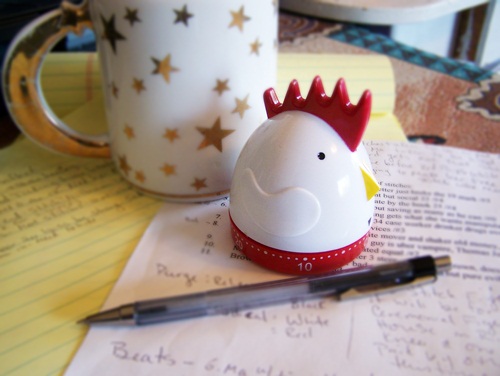Strong Writing, Strong Living
 I’m going to make this a quick post since my web server has been down most the day and I’m not sure how long I’ll have access to my page.
I’m going to make this a quick post since my web server has been down most the day and I’m not sure how long I’ll have access to my page.
I’ve been reading a few posts from authors about how important it is to find your own writing pace that both allows you to enjoy a robust writing career and a robust non-writing life. These posts suggest it’s important to take a day off every once in awhile or to walk away from the computer every day at a set time, work be damned.
That’s something that I’ve been struggling with over the last seven years or so, basically since my novel career began. I write seven days a week. I write, or do some sort of writing related thing, from when I get up in the morning until I go to bed at night. Lunch is usually at my desk. I take a break for dinner with my family, and that usually lasts a couple hours, since we like to watch a show with our meal.
I’ve found that working twelve-ish hour days seven days a week for the last seven-ish years isn’t really bolstering my creativity and helping me get more done. Instead, I find myself doing the blank-screen stare while the minutes tick away, or I search for relief from work-now work-always by clicking away from my projects to anywhere else on the internet. One click becomes a few. A few becomes a lot, and then those clicks are a habit that breaks up the creative flow.
So I’m doing a little self-assessment this month. I have a book to revise by the beginning of September, I have another (mostly unwritten) book to turn in by mid-October. And I want these to be good books, fun books, engaging books. (I want all my books to be those things, of course!) I also want to walk away from my computer at a certain time each day and feel like I have put in enough work for the day. I want to see a few movies. I want a couple days off with my friends and family, more time to exercise, and I won’t even bring up how much knitting I’d like to be doing.
I’m not sure how I’m going to achieve my Strong Writing, Strong Living goal, but I’ve decided it’s a goal. And setting a goal* is the first step to achieving it, right?
*ETA: I’m actually hoping that by setting better work hours and off time, that I’ll become a *more* productive writer. Fingers crossed, people. Fingers crossed. 🙂

5 Comments
Deborah Blake
I’ve been struggling with the balance issue too. Sigh. Let me know how that goes.
I am FORCING myself to take a week off from writing things to catch up on All the Other Things now that I have finished the 1st draft of novel 2 for Berkley. You know, as soon as I write that article I thought was due Sept 1st, but was actually due yesterday. *headdesk*
cricketB
Many studies have shown that between 35 and 40 hours a week is optimum for long-term productivity. That’s paid work, so add another few hours of housework (which is mostly brainless). Sure, you can crunch for a bit, but eventually it catches up. These studies were done pre-internet, when it wasn’t as easy to click away from the task at hand.
Dana
As a writer who is working full time as a non writer I found your post inspiring. Of course I wish you luck on finding your balance (a word I use quite often trying to balance a day job and feeding my passion of writing), but it’s also a good reminder for me. I don’t slack at my day job, yet I tend to make excuses why I am not writing in my spare time. I sometimes crave and day dream a full time writing career, but I need to be reminded that even though it’s what I love and the day I can do it full time, I still need balance. I need to be grateful I have the freedom to write, but aware enough to let it become overwhelming. I believe being a writer is 24/7; it’s not like my 40 hour work week as a non writer, but a lifestyle you can still balance none the less. Even when I’m at my non writing job I am thinking of my writing. When I’m with friends, I’m thinking of my writing, but I think that is the life of a writer. Our brains never shut off, they can’t. We can find a balance of enjoying non writing friends and hobbies and events though.
Reading your post (from an author I admire and respect) allows me to stay focused on balance before it ever even becomes an true issue. I thank you for sharing it. I look forward in reading more about HOW you accomplish this and again, I wish you the best in finding your inner and outer balance of writing and non writing life.
Cathy/greytfriend
I think taking the time for different experiences is important, it lets your brain move in different directions and gives new ideas room to pop in. And you just need to have fun and relax more too, you have to stay physically and mentally healthy and fresh. It really is about finding that balance.
Alan
I found this an interesting blog concerning the balance between writing and the non-writing parts of life. I’ve been writing seriously for just short of two years now and find that the writing I do after work most afternoons for 3-5 hours goes well. If I had my choice, I think I’d still work PT just to have the down time from writing, now I have two PT jobs. This downtime gives me a chance to let my writing simmer on the back burner and occasionally I have the opportunity to chat up a coworker about what’s going on with my writing, which helps with story and character ideas. My Sundays are often spent writing, my only full day off right now.
Devon, how does one end up with so much to do? It sounds like you are nose to the grindstone.
Is this the catch? Too much focus on something like writing and our productivity/creativity starts to dilute? As hard as we try, the more time we spend on writing doesn’t equate to better work? If we could each find our own “perfect pace, perfect balance” between writing and non-writing than we’d be in balance.